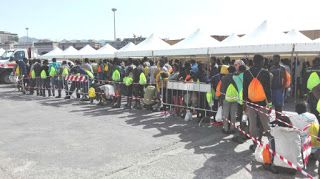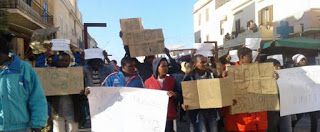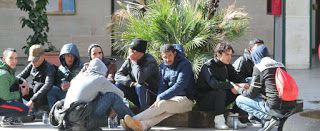Contradictions and Violations of Human Rights in the Pozzallo Hotspot
Source: meltingpot.org
This is the first report from the Overthefortress campaign in South
Italy, from the Province of Ragusa.
It
includes an interview with Giuseppe Cannella from Doctors for Human Rights
(MEDU*)
as
well as Lucia Borghi from Borderline Sicilia.
Overthefortress’s independent investigation and monitoring work
begins in Ragusa. We have chosen to start with the Pozzallo Hotspot,
where 16,158 people have landed since January 2016. This is the first
stop in Italy along the Central Mediterranean route, a journey which
begins much further away however, much further south. It begins in
North Africa, in Subsaharan Africa, in the Horn of Africa or in the
Middle East. Different beginnings which converge in Libya, the
country of departure for almost all the migrants who land on Italy’s
coasts.
The former ‘First Reception Centre’ (CPA*) in the port is now one of
the 4 centres in Italy where the Hotspot procedures are carried out.
It should be noted that the Hotspot approach was defined in a
communication from the Ministry of the Interior and not via any law,
and that the procedures begin already while at sea. The main
objective is the identification of all migrants, even through the
obligatory taking of finger prints, as well as the picking out of
suspected boat drivers. In theory these are only transitory
structures, but in practice they are becoming holding sites without
any juridical definition. Borderline Sicilia has made official
complaints on numerous occasions regarding the violations of human
rights, including the lack of the right to individual information, as
well as the procedure of “deferred rejection” notices which
preclude any possibility for migrants to ask for international
protection.
We asked Lucia Borghi of Borderline Sicilia, an organisation which
has been monitoring the region for years, to explain the situation to
us. The government’s main work is to identify the suspected boat
drivers: the investigations start on the vessels, and then pass from
the rescue operation to another level. The work is based on a
pre-planned schema which foresees the arrest of two people for every
boat, the news of which is broadcast to the media so as to obtain
praise from the EU for the operations. Various contradictions arise
from these procedures. The suspected boat drivers have explained that
they are, in fact, victims of human trafficking, and of having
followed orders they were given only a few hours prior to departure
by the traffickers in Libya, in exchange for a deduction on the price
of the voyage. This has been confirmed by the fact that many come
from countries far away from the sea, and therefore with a total lack
of any nautical knowledge. On arrival at port, the government’s
engagement with guaranteeing a dignified reception is decisively
inferior to that of the police operations.
In
theory no one is meant to stay in the Hotspot more than 48-72 hours,
and then be transferred elsewhere. In practice this is not what
happens, and almost everyone is detained for weeks. The official
reasoning is that there are not enough places in the reception
system, especially for unaccompanied minors and vulnerable cases.
This creates the paradox that it is exactly those who, due to their
noted fragile situation, should be inserted into a centre first, and
the very same who remain for the longest time. We met four minors on
the streets at the port, all of whom told us they had been
disembarked on September 12th.
The migrants are allowed to leave the centre after the first 72
hours. And this isn’t good will: before, no one was allowed out, but
to leave people locked up in an overcrowded centre for weeks at a
time was creating inevitable problems and tensions. It should be
emphasised that, in fact, the official capacity of the centre is
180-200 people, but it now hosts more than 600. The complex is made
up of two huge rooms, and therefore it is impossible to separate the
men and women, the minors and adults, as is however foreseen by
various European regulations.
To
better understand the situation of those trapped in the Hotspot, we
spoke with Giuseppe Cannella, a medical psychiatrist with Doctors
for Human Rights
(MEDU*).
His medical point of view concentrates especially on the trauma
undergone by migrants before, during and after the journey at sea.
Almost everyone arrives from Libya,
which can be described as a living hell. Migrants tell of being faced
by abductions and systematic violence. Both armed gangs and policemen
arrest people arbitrarily and ask for ransom from their victims so
that they can continue their journey. They are tortured in these
prisons while in phone contact with family or friends, so as to
extort money from them. Those who do not manage to find the money are
forced to work in inhumane conditions to repay the debt, or worse.
We note that everyone suffers the same treatment: men, women and
children. While arriving with the wounds of this violence they then
suffer the horrors of the open sea. Giuseppe tells us that even after
the rescue operation, they find themselves again among uniforms and
weapons, in a decisively inhuman relation, again provoking a true
re-traumatisation for the migrants. This attitude continues at the
quay, where their names are replaced with numbers, and they are
managed like objects. A clear example of this is when, in an
overcrowded room, those with scabies are yelled at to move themselves
to the other side of the room.
It is difficult to describe the feelings we experience while
listening to these stories, next to the sea which is the stories’
theatre, and a few steps away from a disarray of boats and hundreds
of life jackets. We have been reflecting on the words we have heard,
and remain disturbed by the voices of these young African men who,
despite everything, tell us: “I’m fine.” It is difficult to take
on board all the information we have heard in the first few days of
our journey, but it is clear that the Pozzallo Hotspot, and the
inhuman conditions it offers, is a symbol of the failure of Italian
and European reception. It is exactly for this reason that this is
not the kind of integration that we believe in, that soon we will go
on to learn about, and narrate, good examples of reception from
below.
- €5
for 10km: support the #Overthefortress camper - A two-month journey from Sicily to Rome, within and beyond the Central Mediterranean Route (See the map, click on the numbered icons for further information)
- Follow
us: www.meltingpot.org - Share:
Facebook – Twitter –
Instagram
– For further information:
overthefortress@meltingpot.org
Project
“OpenEurope” – Oxfam Italia, Diaconia Valdese, Borderline
Sicilia Onlus
Translation
by Richard Braude




